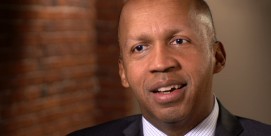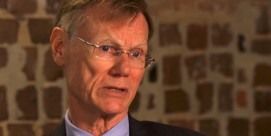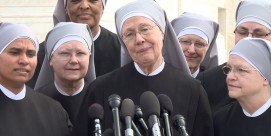 TIM O’BRIEN, correspondent: The Supreme Court has been emphatic about the need for the law to be clear and consistent. But given the complexity of the issues it is called on to decide and changing personnel on the Court….
TIM O’BRIEN, correspondent: The Supreme Court has been emphatic about the need for the law to be clear and consistent. But given the complexity of the issues it is called on to decide and changing personnel on the Court….
Chief Justice John Roberts: “Congratulations and welcome to the Court.”
O’BRIEN: ...it frequently is neither. For example, in 1985 the Court prohibited any tax dollars going to parochial schools—“excessive government entanglement with religion,” the Court said. Twelve years later, following the appointment of more conservative justices, the Court flipped on that, even allowing public school teachers to teach in Catholic schools.
The appointment of Justice Anthony Kennedy after the bruising confirmation fight over Robert Bork in 1987 shows how a single appointment can change our world. Kennedy wrote the 5-4 decision against benedictions at high school commencement ceremonies. Bork has written critically of the decision, which presumably would have gone the other way had he been confirmed—and others. Like abortion. In 1992, Kennedy provided the fifth vote to reaffirm Roe v. Wade, the landmark abortion decision, instead of overruling it as the president who appointed him had hoped.
 It is unusual for the Court to flatly overrule itself, but it has happened in several hot button cases, and again one justice, often Anthony Kennedy, played the pivotal role. Kennedy has become a champion for gay rights. In 2003, he wrote the landmark decision throwing out Texas’s sodomy law, overruling a 1986 decision allowing states to criminalize homosexual behavior. Two years ago, he wrote another ground-breaking decision effectively legalizing same sex marriage nationwide. And the death penalty. In 1989, the Court upheld the death penalty for offenders under the age of 18 and for those found to be mildly retarded. Both decisions were subsequently overruled on 5-4 votes with Kennedy again figuring prominently in the outcome.
It is unusual for the Court to flatly overrule itself, but it has happened in several hot button cases, and again one justice, often Anthony Kennedy, played the pivotal role. Kennedy has become a champion for gay rights. In 2003, he wrote the landmark decision throwing out Texas’s sodomy law, overruling a 1986 decision allowing states to criminalize homosexual behavior. Two years ago, he wrote another ground-breaking decision effectively legalizing same sex marriage nationwide. And the death penalty. In 1989, the Court upheld the death penalty for offenders under the age of 18 and for those found to be mildly retarded. Both decisions were subsequently overruled on 5-4 votes with Kennedy again figuring prominently in the outcome.
Another potentially seismic change occurred when Justice Sandra O’Connor, a moderate, retired in 2006, to be replaced by the more conservative Samuel Alito. That swap has left the Court less receptive to affirmative action—but more amenable to government accommodation of religion.
Chaplain, U.S. House of Representatives: “Let us pray…..”
O’BRIEN: For example, it is well-established that government bodies may begin their sessions with a short prayer, but three years ago the Court allowed Greece, New York to begin its town council meetings with a ceremony that resembled a Catholic mass.
Priest at lectern: “Jesus Christ, who taketh away the sins of the world….”
 O’BRIEN: Justice Alito provided the needed fifth vote. Justice O’Connor would likely have steered the Court in a different direction. The Court has had a delicate ideological balance over the last 30 years with Justice Kennedy often finding himself in the middle—the so‐called “swing” justice. President Trump’s choice of Neil Gorsuch to replace Antonin Scalia—if confirmed—would probably not affect that balance as Gorsuch is believed to share Scalia’s conservative views. Gorsuch is all but certain to be asked at his confirmation hearings about his view—like Scalia’s—that the Constitution must be interpreted as it was written when adopted in 1789.
O’BRIEN: Justice Alito provided the needed fifth vote. Justice O’Connor would likely have steered the Court in a different direction. The Court has had a delicate ideological balance over the last 30 years with Justice Kennedy often finding himself in the middle—the so‐called “swing” justice. President Trump’s choice of Neil Gorsuch to replace Antonin Scalia—if confirmed—would probably not affect that balance as Gorsuch is believed to share Scalia’s conservative views. Gorsuch is all but certain to be asked at his confirmation hearings about his view—like Scalia’s—that the Constitution must be interpreted as it was written when adopted in 1789.
History teaches otherwise. In the last 20 years, we’ve seen five vacancies on the Court and changing social attitudes on a wide range of social issues, like gay rights and same-sex marriage. Times do change, and so do the justices. For better or worse, what the Constitution really means would seem to have changed over the years, right along with them.
For Religion & Ethics NewsWeekly I’m Tim O’Brien in Washington.

 TIM O’BRIEN, correspondent: The Supreme Court has been emphatic about the need for the law to be clear and consistent. But given the complexity of the issues it is called on to decide and changing personnel on the Court….
TIM O’BRIEN, correspondent: The Supreme Court has been emphatic about the need for the law to be clear and consistent. But given the complexity of the issues it is called on to decide and changing personnel on the Court…. It is unusual for the Court to flatly overrule itself, but it has happened in several hot button cases, and again one justice, often Anthony Kennedy, played the pivotal role. Kennedy has become a champion for gay rights. In 2003, he wrote the landmark decision throwing out Texas’s sodomy law, overruling a 1986 decision allowing states to criminalize homosexual behavior. Two years ago, he wrote another ground-breaking decision effectively legalizing same sex marriage nationwide. And the death penalty. In 1989, the Court upheld the death penalty for offenders under the age of 18 and for those found to be mildly retarded. Both decisions were subsequently overruled on 5-4 votes with Kennedy again figuring prominently in the outcome.
It is unusual for the Court to flatly overrule itself, but it has happened in several hot button cases, and again one justice, often Anthony Kennedy, played the pivotal role. Kennedy has become a champion for gay rights. In 2003, he wrote the landmark decision throwing out Texas’s sodomy law, overruling a 1986 decision allowing states to criminalize homosexual behavior. Two years ago, he wrote another ground-breaking decision effectively legalizing same sex marriage nationwide. And the death penalty. In 1989, the Court upheld the death penalty for offenders under the age of 18 and for those found to be mildly retarded. Both decisions were subsequently overruled on 5-4 votes with Kennedy again figuring prominently in the outcome. O’BRIEN: Justice Alito provided the needed fifth vote. Justice O’Connor would likely have steered the Court in a different direction. The Court has had a delicate ideological balance over the last 30 years with Justice Kennedy often finding himself in the middle—the so‐called “swing” justice. President Trump’s choice of Neil Gorsuch to replace Antonin Scalia—if confirmed—would probably not affect that balance as Gorsuch is believed to share Scalia’s conservative views. Gorsuch is all but certain to be asked at his confirmation hearings about his view—like Scalia’s—that the Constitution must be interpreted as it was written when adopted in 1789.
O’BRIEN: Justice Alito provided the needed fifth vote. Justice O’Connor would likely have steered the Court in a different direction. The Court has had a delicate ideological balance over the last 30 years with Justice Kennedy often finding himself in the middle—the so‐called “swing” justice. President Trump’s choice of Neil Gorsuch to replace Antonin Scalia—if confirmed—would probably not affect that balance as Gorsuch is believed to share Scalia’s conservative views. Gorsuch is all but certain to be asked at his confirmation hearings about his view—like Scalia’s—that the Constitution must be interpreted as it was written when adopted in 1789.






